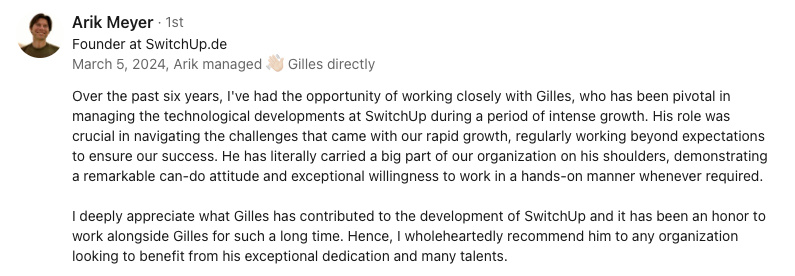Abstract:
The article explores the transformative impact of AI-powered decision-making tools on startups, highlighting their ability to simplify complex data, predict trends, and enhance strategic planning. AI technologies like Tableau, Microsoft Power BI, Google Cloud AI, and IBM Watson Studio are revolutionizing data analysis and scenario planning by converting intricate data into actionable insights and enabling proactive responses to market changes. The piece includes success stories from European startups like UiPath, Darktrace, and BlaBlaCar, illustrating AI's role in enhancing efficiency, cybersecurity, and user experience. Additionally, the article stresses the importance of balancing AI insights with human intuition, emphasizing that human oversight is crucial in interpreting AI-generated data for nuanced decision-making. It discusses the challenges startups face in AI adoption, such as data management, skill shortages, and cultural resistance, and offers solutions like strategic partnerships, continuous training, and leadership commitment. The article concludes by envisioning future trends in AI, such as advanced machine learning and natural language processing, which promise to further revolutionize strategic planning and leadership, ultimately driving innovation and market success for startups.
Navigating the unpredictable journey of a startup can often feel overwhelming with so much data at hand. Thankfully, AI-powered decision-making tools are stepping up to simplify things, turning what once felt chaotic into clear insights. This piece looks at how these tools are changing startup planning, using AI to make sense of data, predict trends, and improve decisions. Whether you're tackling data analysis or trying to refine your plans, the insights here might just be what you need to unlock potential.
AI-Powered Decision-Making Tools
Making informed decisions is crucial for a startup's growth. AI-powered tools are becoming essential, helping startups find clarity among heaps of data.
Data Analysis and Forecasting Tools
AI in data analysis turns complex data into clear insights. Tools like Tableau and Microsoft Power BI simplify information into visuals and dashboards. They transform data into actionable insights, guiding strategic planning. For example, a startup can convert sales data into visual trends, guiding decisions like market expansion. From my experience, tools like these are game-changers for startups aiming to strategize effectively without drowning in data.
The true power of these tools lies in predictive analytics. They not only show where we are but also where we're headed. By analyzing past data, they forecast future trends, helping startups plan strategically. AI-driven analytics can alert a business to market shifts, allowing for strategic pivots. Insights from Roland Berger and the World Economic Forum highlight how predictive capabilities enable startups to anticipate and navigate future scenarios confidently.
AI in Scenario Planning
AI in scenario planning is like having a weather forecast—it helps startups prepare for changes. AI simulates market conditions and provides strategies. Unlike static traditional planning, AI-driven scenarios adapt to new data. This flexibility lets startups test strategies without real-world risks. Using platforms like Google Cloud AI and IBM Watson Studio, startups can handle market volatility with agility. In my own experience, using AI for scenario planning has allowed me to make informed decisions quickly, without the fear of being caught off guard by market changes.
Decision Support Systems
AI-equipped decision support systems are like having expert consultants 24/7. These systems simulate strategic scenarios, helping startups allocate resources wisely. Imagine a tool that builds pathways based on data insights. Tools from H2O.ai ensure every penny is spent wisely, aligning operations with goals. Combining data insights with human intuition creates a decision-making duo balancing analytical precision with creativity.
The synergy of AI and human intuition crafts decisions that are both smart and creatively adaptable. Companies using RapidMiner or SAS Viya blend rigorous data analysis with market understanding. This ensures strategic planning is both robust and flexible, offering data-backed recommendations and room for creativity.
Success Stories of AI Integration in European Startups
Real-world examples show how AI revolutionizes business practices. Looking at specific case studies helps us understand AI's impact on operations and strategic planning.
Transformative Outcomes
Enhanced Efficiency with UiPath
UiPath, from Romania, shows how AI redefines efficiency by integrating into robotic process automation (RPA). Their AI tech streamlines backend processes, automating tasks quickly and accurately. This reduces costs and frees human resources for strategic work. Automating repetitive tasks reportedly cuts costs by up to 80%. From leading digital transformations, I've seen how efficiency improvements boost productivity and competitiveness.
Darktrace's Cybersecurity Revolution
In the UK, Darktrace exemplifies AI's role in cybersecurity, enhancing threat detection and response. Their machine learning algorithms provide real-time security insights, surpassing traditional measures. Cutting detection times from hours to seconds shows AI's potential to actively defend digital infrastructures. In IT services management, timely security interventions preserve reputations.
Optimizing User Experience with BlaBlaCar
BlaBlaCar in France uses AI to enhance user experience in carpooling, predicting ride availability, and improving matchmaking. AI optimizes travel schedules based on user patterns, boosting satisfaction and engagement. In dynamic markets, refining user experience with AI can differentiate for sustained growth.
Strategic Advantages
Revolut's Competitive Edge in Financial Services
Revolut in the financial sector uses AI to enhance security and personalization. AI-driven fraud detection systems efficiently protect transactions. Simultaneously, personalized financial advice boosts user satisfaction and trust. Offering secure, personalized banking attracts and retains customers in a crowded market.
Automated Lead Generation with Cognism
UK-based Cognism automates lead generation with AI, increasing sales efficiency and revenue. By automating lead identification, sales teams focus on closing deals. This boosts conversion rates and revenue, transforming manual processes into strategic growth.
Strategic Foresight with AI-Driven Market Trend Analysis
AI's market trend analysis provides startups with strategic foresight. Understanding emerging patterns helps startups make agile decisions, staying ahead. AI-driven tools analyze data faster than traditional methods, offering a strategic edge to lead markets.
Balancing AI Insights with Human Judgment
In a world where AI shapes decision-making, a blend of AI insights and human judgment is key. This harmony is crucial for startups using AI while valuing human intuition.
Complementary Roles
- Human oversight is vital in interpreting AI data. While AI offers automated insights, humans provide context, essential for nuanced decisions.
- The World Economic Forum notes AI's strength in patterns but weakness in complex contexts.
- My experience in decision-making highlights human oversight ensures AI complements our strategic insights.
- Cross-disciplinary skills enhance this balance, bridging technical precision and strategic foresight.
In this landscape, cross-disciplinary skills are crucial. AI integration requires understanding business domains. Organizations with diverse teams, combining data science with business acumen, excel in AI integration. In e-commerce and IT services, diverse skills seamlessly integrate AI with strategic business goals.
Successful synergy between AI and human expertise leads to superior outcomes. Investing in training and fostering collaboration ensures AI enhances decision-making. Companies like Google and Facebook model this dynamic effectively, leveraging cross-functional teams to bridge AI with human insight.
Human Intuition in AI-Driven Decisions
AI excels in data tasks but struggles with human contexts. This limitation emphasizes human intuition's importance in planning. AI's blind spots mean decisions solely based on AI might miss critical context and creativity. In leadership roles, AI decisions benefit greatly from human intuition, adding depth and relevance.
Creating a culture that values both AI and human input is a strategic advantage. Encouraging experimentation and collaboration balances technology and creativity. Leadership commitment embraces AI while valuing human contributions, fostering strategic flexibility and innovation.
Human intuition is crucial. On e-commerce platforms, human insights navigate market dynamics, understanding cultural preferences that AI models miss. This blend of AI and intuition leads to more successful outcomes, showing the necessity for human expertise alongside AI insights.
Overcoming AI Adoption Barriers
Navigating Data Challenges
Startups face hurdles in collecting and managing data for AI systems. High-quality datasets are key, yet startups struggle with data privacy issues and volume. Poor data management hinders AI integration. From tech experience, overcoming these challenges requires strategic data governance, ensuring data is accurate and secure. Additionally, understanding local data regulations can help startups navigate these challenges more effectively.
Addressing Skill Shortages
Skill shortages in AI fields are a major challenge. Demand for expertise is high, but supply is limited. This gap complicates AI integration as startups struggle to build capable teams. Industry reports indicate the battle for talent increases hiring costs, challenging startups with tight budgets.
Overcoming Cultural Resistance
Cultural resistance can hinder AI adoption. Employees may fear job displacement or resist workflow changes. Overcoming resistance fosters innovation. Promoting open dialogue about AI's benefits and how it augments roles is key. Encouraging a culture embracing change builds resilience against technological shifts.
Building a Resilient AI Strategy
Leadership Commitment
Leadership commitment drives AI initiatives and nurtures innovation. Leaders visibly supporting AI adoption set a positive tone, signaling its importance. This commitment translates into strategic AI investments, aligning efforts towards goals.
Fostering Partnerships with Research Institutions
Partnering with research institutions provides access to AI talent and innovations. Collaborations tap into knowledge and expertise, leading to joint projects and innovation labs. Partnering with academic teams keeps startups ahead of trends and tech advancements.
Continuous Training and Upskilling
Continuous training and upskilling are crucial for effective AI integration. As technology evolves, keeping employees skilled maintains competitiveness. Investing in learning programs builds proficiency in AI technologies, enhancing strategic outcomes.
By addressing these areas, startups can integrate AI into operations and achieve sustainable growth.
Embracing Future Trends in AI
The AI landscape in decision-making is evolving, offering startups potential with new technologies.
Emerging Technologies
- Advanced machine learning analytics revolutionize strategic planning. These models provide deep predictive insights, forecasting market trends and customer behaviors.
- Natural language processing (NLP) tools enhance customer experiences. Analyzing textual data from feedback to social media trends, startups refine strategies in real-time.
- Generative AI opens possibilities in creative tasks like product design and marketing. Automating creative processes lets startups explore new concepts quickly, fostering creativity and pushing strategic planning boundaries.
AI's Evolving Role in Leadership
AI in leadership enhances cognitive functions and decision-making. AI provides leaders with analytical insights for informed decisions, leading to efficient, data-driven planning. AI-driven decision support systems refine strategies by simulating scenarios, guiding effective decisions.
AI enables personalized, data-driven leadership. Detailed analytics allow leaders to tailor strategies, enhancing strategic effectiveness and aligning leadership with goals. Integrating AI in leadership transforms planning, opening new avenues for innovation.
In sum, AI in strategic decision-making offers startups incredible potential. Embracing these trends helps drive innovation, enhance leadership, and achieve market success.
AI-powered decision tools can be the clarity your startup needs. They improve data analysis and offer foresight to adapt with agility. Imagine turning complex datasets into clear strategies that guide your startup to success. As you explore AI's potential, consider how these tools can transform planning and operations.
You might be interested by these articles:
- AI's Role in Shaping Tomorrow's Jobs
- Navigating AI's Impact on Future Careers
- AI, Automation, and Future Work Dynamics





